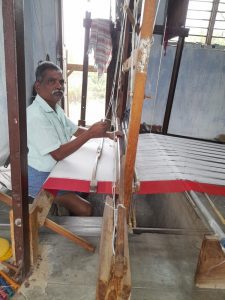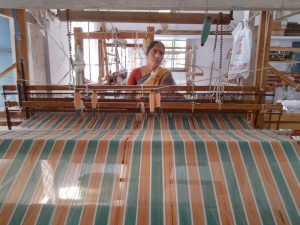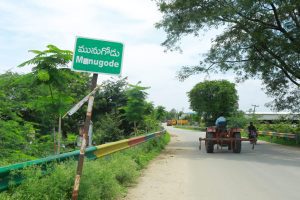Around 30 constituencies in the state including Munugode have a significant Padmashali population. Yet there are no currently MPs or MLAs belonging to the community.

Weavers in Pochampally, Telangana (A Kalyani Assistant Professor, NMIMS)
Konda Laxman Bapuji, a notable leader from the Padmashali community, played an active role in Telangana movements starting from the Liberation of Hyderabad to the formation of a separate state.
Bapuji also served as the Deputy Speaker in the Andhra Pradesh Assembly. In recognition of his services, the horticulture university of the state was named after him.
After him, Ale Narendra, Devarakonda Vittal Rao, Puli Veeranna, Rapolu Ananda Bhaskar, L Ramana, Gundu Sudharani, and others have worked for the welfare of the weavers in general and handloom weavers in particular when they were elected as MPs/MLAs/ministers. But now Ramana, an MLC, is the only elected representative from this community.
According to the calculations of the Telangana government, there are around 1,10,000 weavers working across the state. It is noteworthy that more than one lakh weavers belong to the Padmashali community.
Apart from these, there are a significant number of those from the Padmashali caste engaged in other professions. Overall, their population, especially within the backward castes, is high in the state.
Weaving communities like Padmashalis, Swakulashalis, Kurnis, Katris, Jandras, and Devangas constitute around 5 percent of the population of Telangana, according to unofficial data from Pasmashali associations. Among them, around 90% are Padmashalis.

A handloom weaver from Pochampally, Telangana (Satyanarayana, assistant professor, Loyola Academy)
Most of the time, the Central and state governments take measures for the development of communities that are politically strong but do not come forward to support other social groups — for instance, those that depended on the handloom profession for generations.
Based on the vote-bank principle, political parties support castes that are strong both numerically and politically.
On the other hand, the number of weavers is decreasing day by day due to the crisis in the handloom industry. It is not possible to win either an MLA or MP seat with the votes of only weavers, whose numbers have come down as the majority of the Padmashalis are moving to other occupations.
As far as Telangana is concerned, the state government allocates funds to encourage people who are involved in many traditional occupations, but not handloom weavers.
Distribution of fish seedlings and mini-truck-like vehicles to sell fish, sheep distribution, cancellation of taxes on palm trees, setting up of stalls for drinks like neera, setting up of modern saloons, electricity exemption for laundry shops, providing investment assistance to the farmers who have land, etc., are all measures taken by the state government to protect various caste groups and for the revival of traditional occupations in Telangana.
In this way, the state is taking various measures to strengthen some of the caste-based occupations as ministers and MLAs belonging to these social groups are part of the government.
These elected political leaders from other communities are working for the welfare of their people. But due to the fact that almost no one from the Padmashali community was elected, there is a dearth of politicians who care for the welfare of the weavers.
Unity is seen only among the members of the weavers’ cooperative society. But the caste associations of Padmashalis were weakened and disappeared long ago due to diversification of occupations among them. Wherever they are, they exist only in name.
Groups such as the Padmashali Officials and Professionals Association (POPA) are made up of members of the community who are engaged in other professions but do not include weavers.
The near absence of caste associations among Padmashalis is a sign of modern progress, but an obstacle to political development.

A handloom weaver from Kanukula, Telangana (Ramulu, President, HWCS, Kanukula, Peddapalli district)
Currently, caste cannot be separated from politics in the country and the empowerment of any caste depends on its numerical strength. Any weakening of caste associations is an obstacle to the development of the community in general and for those who engage in traditional caste occupations in particular.
In about 30 Assembly segments of Telangana, the voters belonging to the Padmashali community play an important role. In some places, a few belonging to this caste are well-educated and willing to do social service, have political experience and financial strength, but parties do not give them tickets. This is because all parties look at voters belonging to the Padmashali caste and weavers as separate.
In other words, the top leaders of various political parties are under the false impression that even if they introduce welfare schemes for weavers — a minority within the community — the votes of other Padmashalis will not come to them.
It is a fact that no major party in the state gave a ticket to a candidate belonging to the Padmashali community in the upcoming Munugode Assembly by-election, where they form around 10 percent of the population.

A road to Munugode, where an Assembly bypoll is scheduled for 3 November (Raj Rayasam/South First)
Sircilla, Parkal, Balkonda, Bhongir, Jagtial, Siddipet, Vemulawada, Warangal (East), Musheerabad, Amberpet, Alair, Huzurabad, and Gadwal are some other Assembly segments of the state that have a significant number of Padmashali voters.
Therefore, people belonging to the community can unite and put pressure on the political parties to give tickets to Padmashali candidates in these segments in the upcoming Assembly elections.
Weavers will get political support and their problems will be discussed in the Assembly only if the rich people, cloth merchants, POPA members, and other Padamshalis who have moved to different occupations work together to ensure decent representation from the community — perhaps at least half-a-dozen MLAs — in the upcoming Assembly elections.
Only then can the elected leaders of the community raise their voices over the problems in the handloom sector and pressurise the government to come up with policies related to the empowerment of weavers financially, helping them lead a dignified life.
And only then can the handloom tradition, which is the heritage of the community, be kept alive.
(Dr Sreeramulu Gosikonda is an assistant professor of sociology, School of Law, Narsee Monjee Institute of Management Studies (NMIMS), Hyderabad. He completed M.Ed. from Osmania University and MA, MPhil, and PhD in Sociology from the University of Hyderabad. His areas of research include sociology of education, education, handloom and textile sector, rural development, and political sociology. These are the personal views of the author)

Jul 26, 2024

Jul 26, 2024

Jul 26, 2024

Jul 25, 2024

Jul 25, 2024

Jul 25, 2024